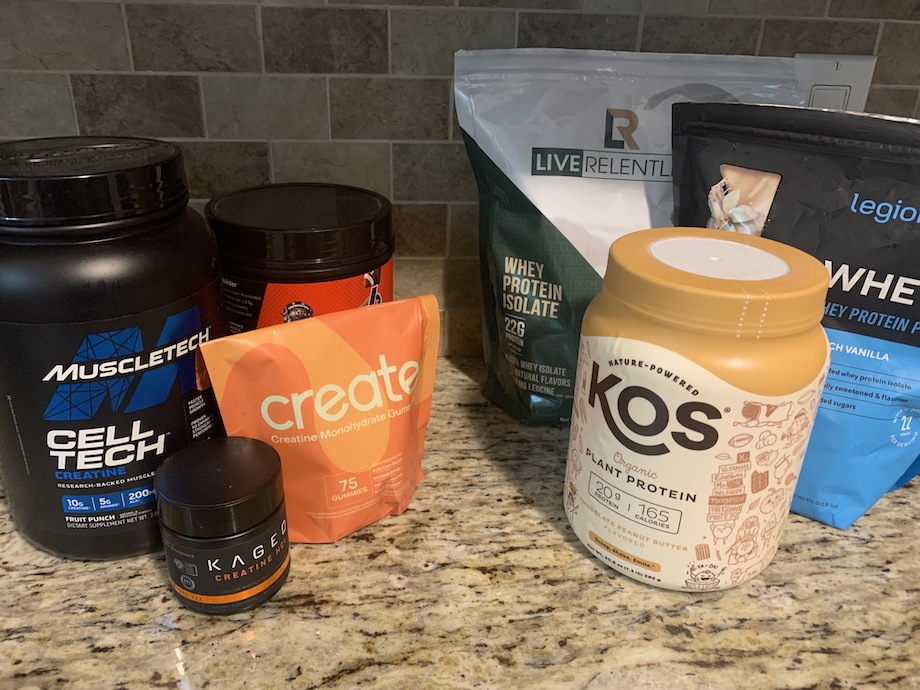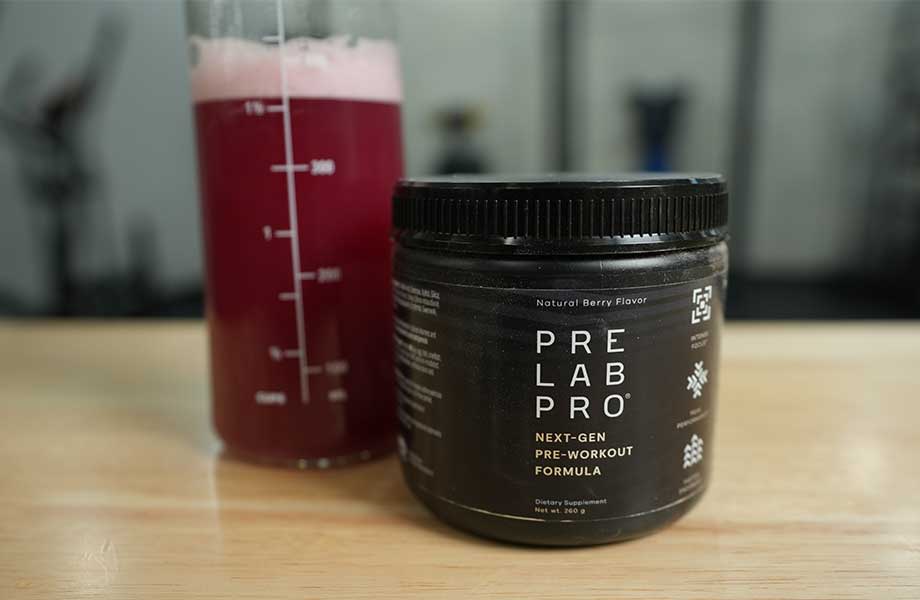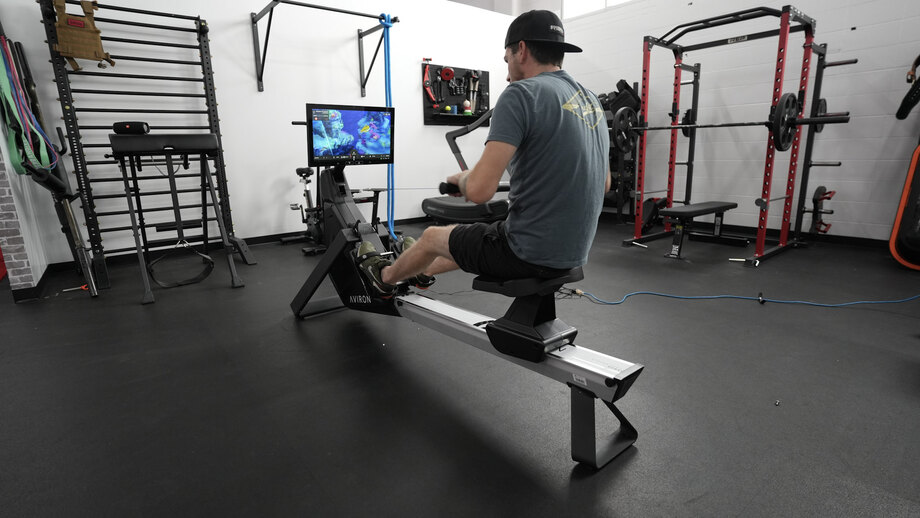We’ve already cleared up the home gym vs gym membership debate—and setting up a home gym (even on a budget) is the obvious answer.
Now, we’re putting two popular supplements and nutrients head-to-head: creatine and protein. While creatine is one of the most-studied workout supplements1 with compelling research to back its benefits, protein also supports fitness and is critical for life as we know it.
So, is there a clear winner when debating creatine vs protein? A registered dietitian weighs in below!
Medical disclaimer: This article is intended for educational and informational purposes only. It is not intended as a substitute for medical advice. For health advice, contact a licensed healthcare provider.
What is Creatine?
Creatine2 is a naturally occurring organic compound sourced primarily from red meat and seafood. The body can also produce creatine from amino acids—specifically arginine, glycine, and methionine—primarily in the kidneys, liver, and pancreas. Beyond whole-food sources, creatine supplements are also available in powder, capsule, or gummy form.
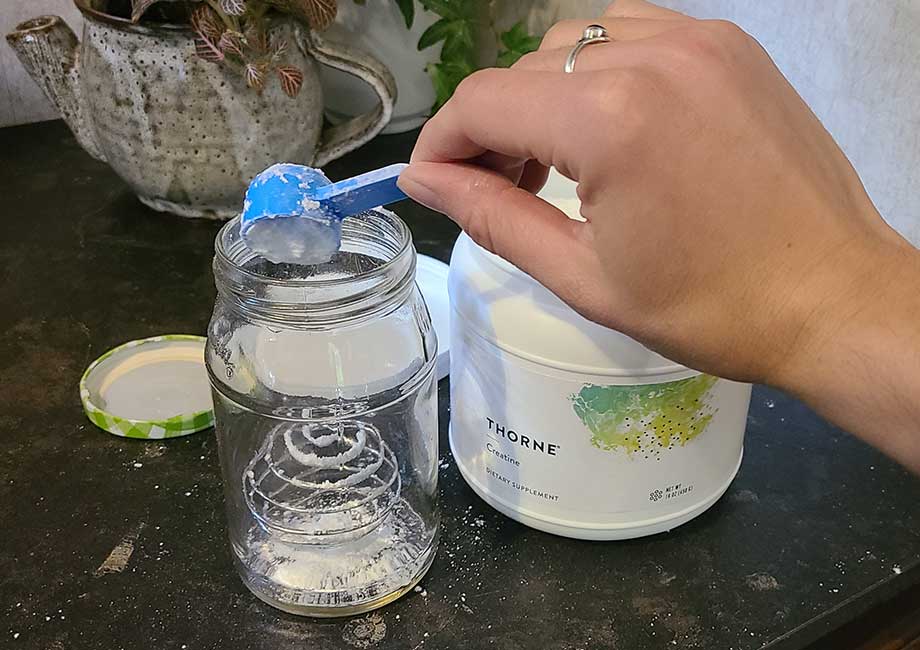
Creatine is converted into phosphocreatine3, also known as creatine phosphate, and stored in skeletal muscle tissue. The body breaks phosphocreatine down into adenosine triphosphate (ATP) to use as a quick energy source and aid muscle contractions, AKA flexing.
The ability to increase the capacity of ATP and energy produced during heavy anaerobically related exercise is why creatine supplements are widely used among bodybuilders and fitness enthusiasts. While many types of creatine supplements exist, creatine monohydrate is the most commonly studied.2
But we can’t forget the other nutrient of interest among fitness buffs and health enthusiasts: protein.
What is Protein?
Protein is one of the three macronutrients—carbohydrates and fat, the other two—that the body needs in large amounts (macro = large). Getting enough protein is critical for providing structure to cells and tissues, protecting against infections, and carrying out other life-sustaining roles.
The macronutrient is primarily made up of amino acids, affectionately named the building blocks of protein. Hundreds of amino acids are found in nature, but only about 20 make up all the proteins in the human body.
Out of the 20 core amino acids, 11 are considered non-essential because the body can produce them if they aren’t consumed from high-protein foods or protein supplements.
Non-essential amino acids include:
- Alanine
- Arginine
- Asparagine
- Aspartic acid
- Cysteine
- Glutamic acid
- Glutamine
- Glycine
- Proline
- Serine
- Tyrosine
The remaining nine are essential amino acids, meaning the body can’t produce them, and they must be consumed from protein-rich sources. Foods containing all nine essential amino acids—like most animal-based proteins—are called complete proteins.
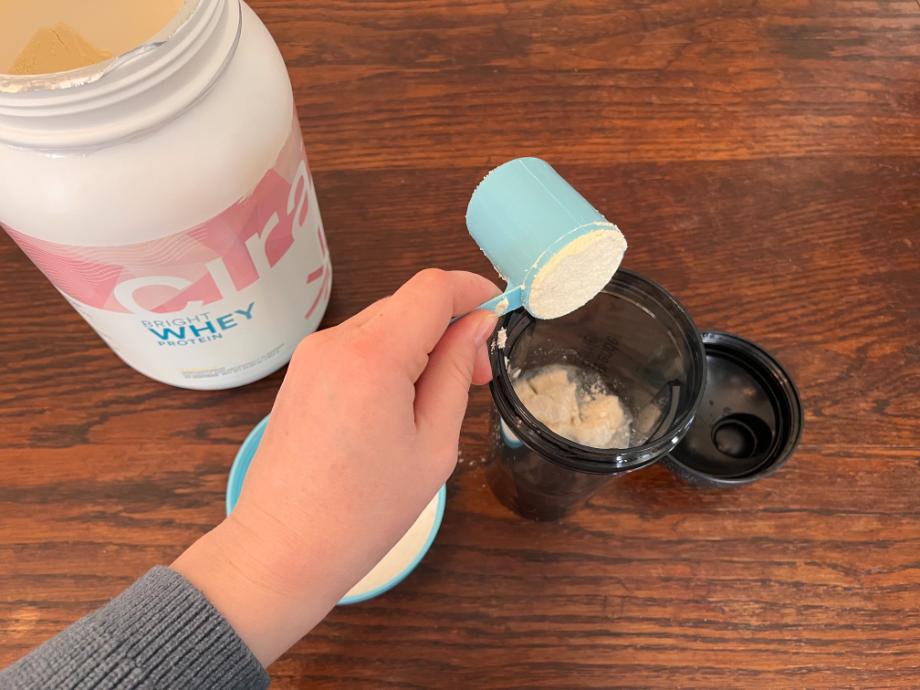
Essential amino acids include:
- Histidine
- Isoleucine*
- Leucine*
- Lysine
- Methionine
- Phenylalanine
- Threonine
- Tryptophan
- Valine*
(Isoleucine, leucine, and valine are branched-chain amino acids (BCAAs) with anabolic—AKA muscle-building—properties.) Overall, all the functions of protein would not be possible without amino acids.
Again, beyond whole-food sources, daily protein intake can be supplemented with protein powder.
Benefits of Creatine
Of the hundreds of supplements, creatine—especially creatine monohydrate—is regarded as one of the most effective. From improving athletic performance to supporting brain function, here’s how creatine may improve your health.
Produces Muscle Energy
The ability to produce quick muscle energy is at the essence of creatine’s benefits. This energy production helps you perform daily functions and high-intensity activities.
Improves Muscle Strength, Power, And Size
Because creatine supplementation can increase the performance of high-intensity and repetitive exercise by up to 20 percent, it’s often recommended for power and strength athletes.2 Research4 also shows long-term creatine supplementation increases muscle strength and size, including in lower limb exercises5 lasting less than three minutes.
Offers Neuroprotection
Creatine offers neuroprotective benefits, especially in injuries and ischemic events when blood supply is hindered. Creatine supplementation may also reduce the severity of a traumatic brain injury (TBI) and spinal cord injury (SCI)—so much the ISSN2 recommends all athletes involved in sports with great risk of a TBI and/or SCI should take creatine to reduce injury severity.
Supports Overall Health
Truly, creatine supports general health, fitness, and well-being throughout the lifespan. Based on a 2021 review6, other beneficial roles of creatine in health and disease may include:
- Improves blood cholesterol and triglyceride levels
- Reduces the risk of chronic diseases like heart disease and certain types of cancer
- Minimizes bone loss
- Enhances metabolic health
- Improves cognition and mental function
- Supports immune health
- Offers antidepressant effects
- Promotes healthy aging, longevity, and independence
Benefits of Protein
While we’ve covered the benefits of protein in full, we’ll sum up its role and importance. (You might be surprised that protein has critical roles beyond muscle-building!)
Enhances Muscle Growth, Strength, and Recovery
In tandem with a proper resistance training regimen, research7 strongly shows protein promotes muscle growth when muscle protein synthesis exceeds muscle protein breakdown—AKA getting enough protein to support your fitness goals and training. And the more muscle you acquire when building muscle, (generally) the stronger you get!
Proper muscle recovery and rest are also essential for aiding muscle growth. A systematic review8 further suggests that post-workout protein intake may reduce muscle soreness and markers of muscle damage.
Improves Body Composition
Improving body composition is often a combo of increasing muscle mass while losing body fat. Many essential factors are at play here, including consuming a diet of high-protein meals.

A 2020 review9 also shows that a high-protein diet increases muscle and fat loss when combined with exercise. Complementary research10 suggests protein promotes weight loss and maintenance by modulating energy metabolism, appetite, and calorie intake.
Aids Bone Health
We tip our hats to calcium and vitamin D for building strong bones, but research11 tells us protein also plays a key role in bone health. In fact, researchers suggest dietary protein is just as essential as calcium and vitamin D for bone health and osteoporosis prevention.
RELATED: Best Vitamin D Supplement
Promotes Overall Health
Protein benefits the entire body beyond strong muscles and bones. Here are the many other ways protein promotes overall health:
- Supports good heart health
- Sharpens the brain
- Supports hormone health
- Aids in wound healing
- Bolsters the immune system
Really, protein is absolutely necessary for life. So, let’s see how much protein (and creatine) you should aim for each day.
Creatine and Protein Dosage
Getting the right dose of creatine and protein is essential to reap the benefits of each. Here’s how much you should aim for.
Creatine
Dosing creatine is generally divided into a loading and maintenance phase, particularly if you’re new to taking it.
During the creatine loading phase, one would supplement with 5 grams of creatine monohydrate—or approximately 0.3 grams per kilogram (g/kg) of body weight—four times daily for 5 to 7 days. The ISSN2 reports this is the most effective way to increase muscle creatine stores, but it’s definitely not necessary to reap the benefits of creatine—if you choose to forgo a loading phase, it will just take longer to see said benefits.
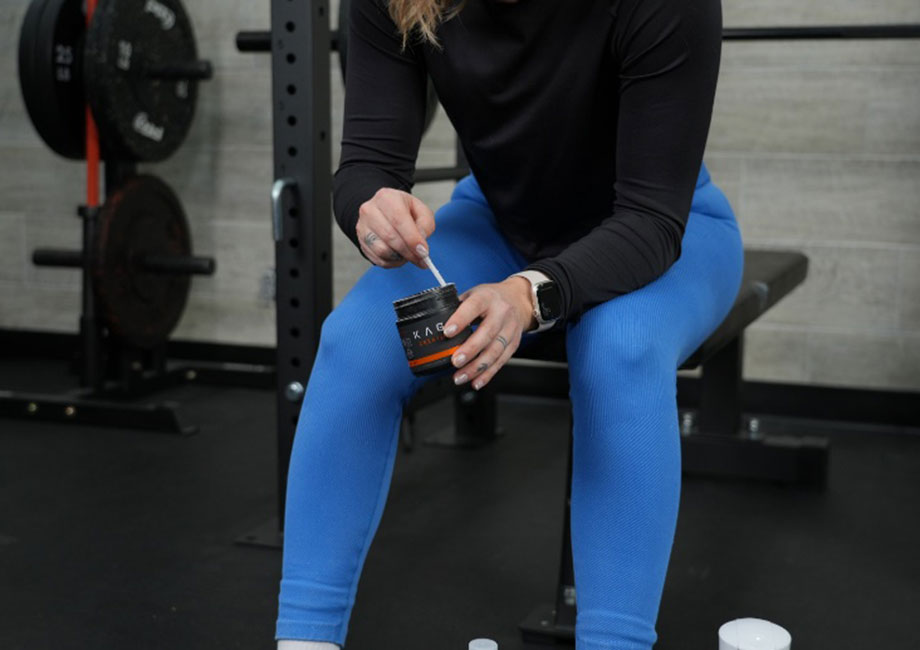
To maintain creatine levels, supplement with 0.03 g/kg daily. For someone who weighs 200 pounds, this amounts to almost 3 grams of creatine per day.
Overall, creatine stores can generally be maintained with 3 to 5 grams daily, but some larger athletes may require up to 10 grams. Taking creatine with a carbohydrate source or a carbohydrate paired with protein may also promote greater creatine retention, but the research is still mixed on this.
Protein
Now you might wonder, “How much protein do I need?” Fortunately, Amanda Capritto, GGR senior staff writer, tells us the answer’s pretty simple. Here are the cliff notes.
While many factors—like body weight, gender, age, activity level, and disease state—impact protein needs, the recommended dietary allowance (RDA) for adults is 0.8 grams per kilogram of bodyweight daily. Based on someone who weighs 180 pounds (or 81.8 kilograms), this calculates to 65 grams of protein per day.
However, reputable organizations—like the Academy of Nutrition and Dietetics and the ISSN—suggest 1.2 to 2.0 grams per kilogram of bodyweight per day is ideal, especially to support muscle recovery and performance. Using the same individual who weighs 81.8 kilograms, protein recs range from 98 to 164 grams of protein daily.
Especially if you consume a relatively low-protein diet, this may seem like a lot of protein to consume daily. However, one of the simplest ways to ensure adequate protein is by dividing it throughout the day—and protein distribution12 may even maximize anabolism.
RELATED: How Much Protein Can Your Body Absorb?
And while the focus should always be on consuming high-quality protein from whole foods, protein supplements can be helpful. There are also many ways to use protein powder beyond a standard protein shake—like adding to oats, smoothies, and baked foods.
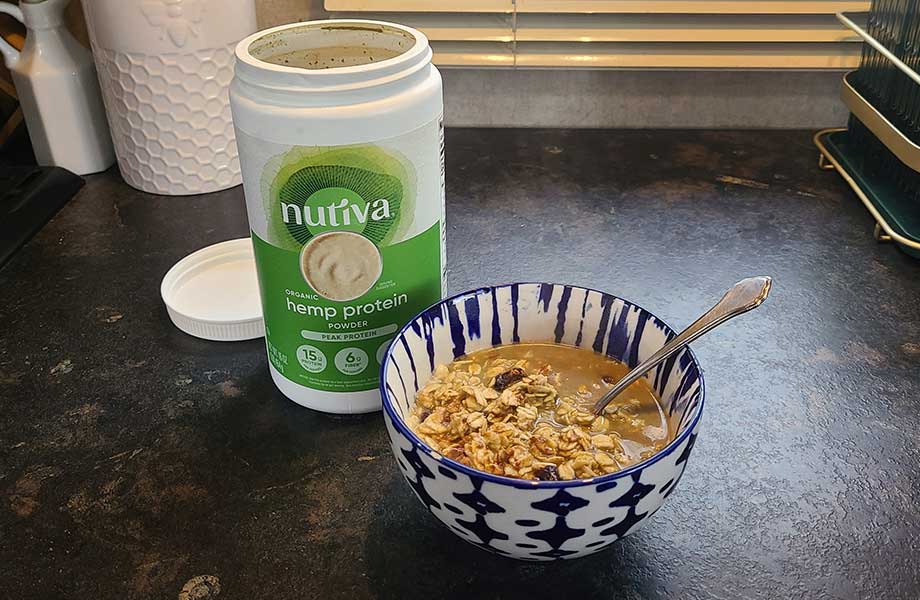
Overall, the RDAs and other recommended protein ranges are drastically different. So for targeted protein (and creatine) recommendations, consult a healthcare professional to determine how much you need.
How Are Creatine and Protein Different?
Categorically, protein and creatine are both molecules made up of amino acids: 11 non-essential and nine essential for protein vs. three non-essential for creatine. The main difference between them is the purpose they serve in the body. Protein is a “building block” macronutrient and can be used to help aid in muscle growth and post-workout recovery. Creatine is typically used for its ability to generate energy in the muscles for improved training performance.
Which One Is Better for Muscle Growth?
While creatine can help increase muscle size, protein is the critical nutritional component for muscle growth. Moreover, you can build muscle with or without creatine but not without protein.
To expand on this more, it’s important to understand how to build muscle in the first place. Simply stated, muscle-building requires resistance training to break down muscle fibers, then adequate calories—especially from protein—help rebuild them.
And according to a 2019 review published in Nutrients7, increased protein intake leads to greater strength and muscle gains when coupled with resistance exercise. Research13 also shows 10 grams of essential amino acids (particularly thanks to the BCAA leucine) or 25 grams of complete protein are sufficient to maximize protein synthesis.
Which One is Better for Performance?
Creatine is better for improving immediate exercise performance, while protein helps secure post-workout, longer-term performance benefits. We’ll explain.
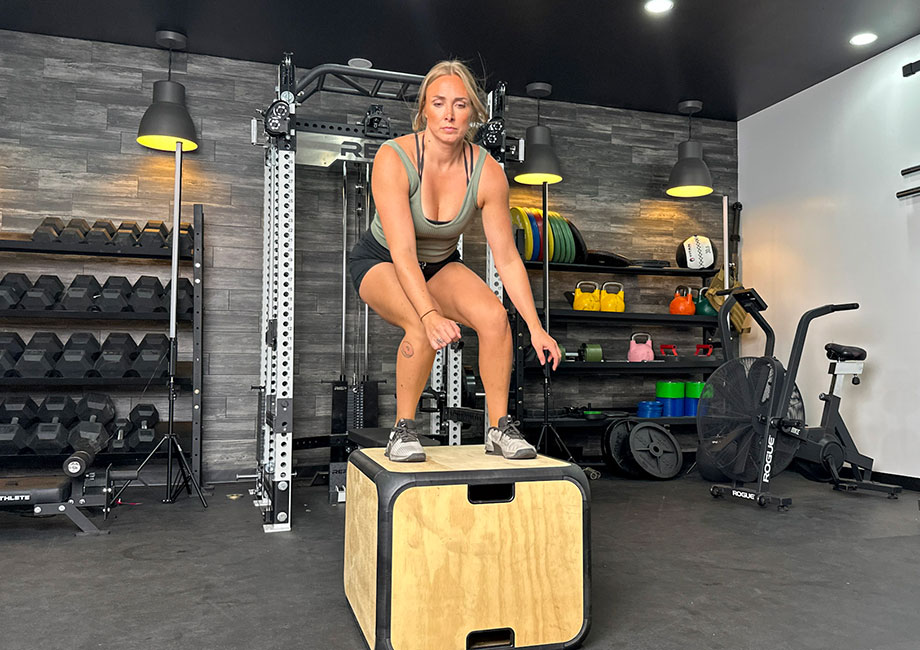
According to the ISSN2, creatine’s the most effective ergogenic nutritional supplement for increasing high-intensity exercise capacity. And while a 2023 meta-analysis14 suggests creatine does not appear to improve endurance, another 2023 review15 reminds us that endurance races are often performed with multiple surges at maximum intensities.
Creatine can also increase muscle glycogen, thus sparing protein and muscle breakdown. Speaking of protein, a 2019 review16 reiterates adequate protein intake among athletes is imperative due to its various roles in performance and recovery.
Creatine vs Protein: Final Thoughts
Of all the sports supplements, creatine and protein are two of the most effective and studied. Here’s a quick recap of what we know:
- Creatine and protein are sourced from whole foods and nutritional supplements.
- Creatine benefits short, high-intensity workouts—like sprinting and weight lifting—and may also support cognitive, bone, heart, and overall health.
- Protein builds and maintains muscle mass while being absolutely essential for overall health and longevity.
Overall, protein should take priority since it’s an essential macronutrient. But because the evidence is clear that BOTH offer immense benefits, slam dunk your health and fitness with the best creatine and best protein powders in the game!
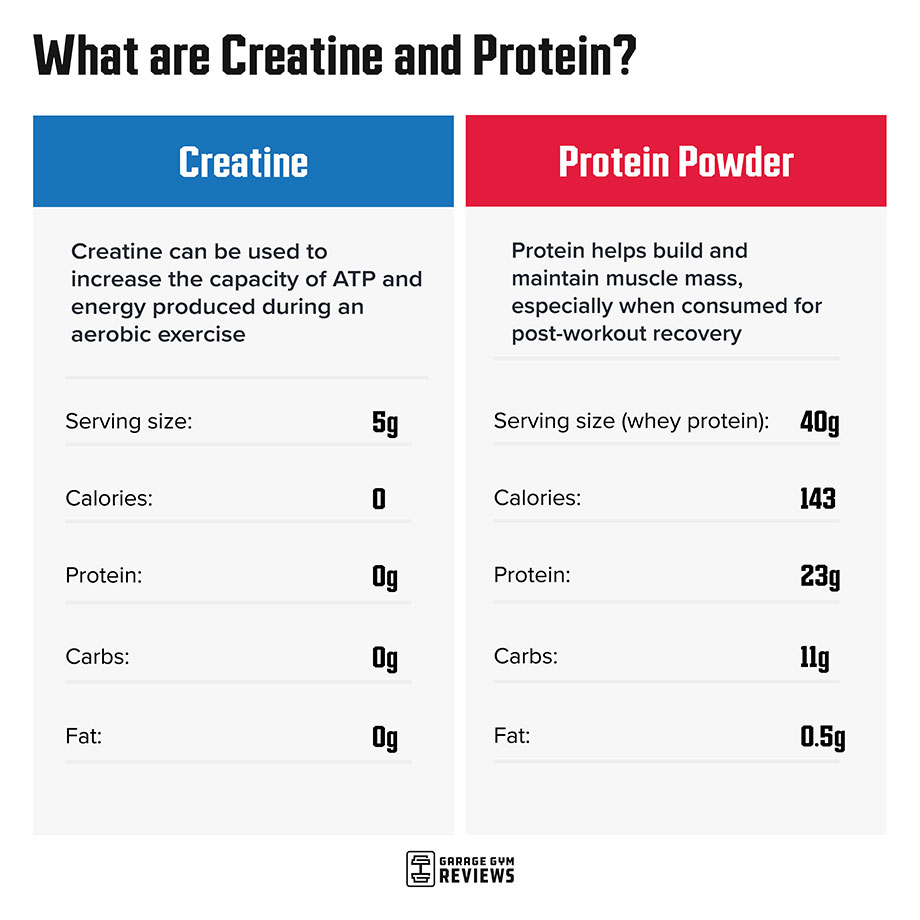
Creatine vs Protein: FAQs
What’s better, protein or creatine?
Because the body needs protein in large amounts to carry out critical body functions, protein should be the utmost focus. Some protein sources—especially red meat and seafood—are rich in creatine so you can get the best of both worlds.
Are creatine and protein the same thing?
Creatine and protein aren’t the same, but they offer benefits in their unique ways. Whereas creatine supplies quick energy to help your muscles contract, protein is necessary for building and maintaining lean muscle.
Should I take creatine or whey protein?
Whether or not you should take creatine or whey protein powder depends on your needs. Whereas whey protein supplementation fills in nutritional gaps, not everyone can tolerate whey protein nor requires it because they get enough protein with foods. You can also take BOTH creatine and whey protein or choose a different type of protein—like vegan protein powder—to best suit your dietary preferences.
Why is creatine better than whey protein?
While creatine’s not necessarily better than whey protein, it confers unique benefits like improving athletic performance, especially in high-intensity workouts. Creatine is only better than whey protein in the presence of a milk or dairy intolerance or allergy, although a casein or plant-based protein could be beneficial.
These statements have not been evaluated by the Food and Drug Administration. This product is not intended to diagnose, treat, cure, or prevent any diseases.
References
- Hall M, Manetta E, Tupper K. Creatine Supplementation: An Update. Curr Sports Med Rep. 2021 Jul 1;20(7):338-344. doi: 10.1249/JSR.0000000000000863. PMID: 34234088.
- Kreider RB, Kalman DS, Antonio J, et al. International Society of Sports Nutrition position stand: safety and efficacy of creatine supplementation in exercise, sport, and medicine. J Int Soc Sports Nutr. 2017;14:18. Published 2017 Jun 13. doi:10.1186/s12970-017-0173-z
- Guimarães-Ferreira L. Role of the phosphocreatine system on energetic homeostasis in skeletal and cardiac muscles. Einstein (Sao Paulo). 2014;12(1):126-131. doi:10.1590/s1679-45082014rb2741
- Willoughby DS, Rosene J. Effects of oral creatine and resistance training on myosin heavy chain expression. Med Sci Sports Exerc. 2001 Oct;33(10):1674-81. doi: 10.1097/00005768-200110000-00010. PMID: 11581551.
- Lanhers C, Pereira B, Naughton G, et al. Creatine Supplementation and Lower Limb Strength Performance: A Systematic Review and Meta-Analyses. Sports Med. 2015 Sep;45(9):1285-1294. doi: 10.1007/s40279-015-0337-4. PMID: 25946994.
- Kreider RB, Stout JR. Creatine in Health and Disease. Nutrients. 2021;13(2):447. Published 2021 Jan 29. doi:10.3390/nu13020447
- Carbone JW, Pasiakos SM. Dietary Protein and Muscle Mass: Translating Science to Application and Health Benefit. Nutrients. 2019;11(5):1136. Published 2019 May 22. doi:10.3390/nu11051136
- Pasiakos SM, Lieberman HR, McLellan TM. Effects of protein supplements on muscle damage, soreness and recovery of muscle function and physical performance: a systematic review. Sports Med. 2014 May;44(5):655-70. doi: 10.1007/s40279-013-0137-7. PMID: 24435468.
- Antonio J, Candow DG, Forbes SC, et al. Effects of Dietary Protein on Body Composition in Exercising Individuals. Nutrients. 2020;12(6):1890. Published 2020 Jun 25. doi:10.3390/nu12061890
- Leidy HJ, Clifton PM, Astrup A, et al. The role of protein in weight loss and maintenance. Am J Clin Nutr. 2015 Jun;101(6):1320S-1329S. doi: 10.3945/ajcn.114.084038. Epub 2015 Apr 29. PMID: 25926512.
- Bonjour JP. Protein intake and bone health. Int J Vitam Nutr Res. 2011 Mar;81(2-3):134-42. doi: 10.1024/0300-9831/a000063. PMID: 22139564.
- Schoenfeld BJ, Aragon AA. How much protein can the body use in a single meal for muscle-building? Implications for daily protein distribution. J Int Soc Sports Nutr. 2018 Feb 27;15:10. doi: 10.1186/s12970-018-0215-1. PMID: 29497353; PMCID: PMC5828430.
- Weinert DJ. Nutrition and muscle protein synthesis: a descriptive review. J Can Chiropr Assoc. 2009;53(3):186-193.
- Fernández-Landa J, Santibañez-Gutierrez A, Todorovic N, et al. Effects of Creatine Monohydrate on Endurance Performance in a Trained Population: A Systematic Review and Meta-analysis. Sports Med. 2023 May;53(5):1017-1027. doi: 10.1007/s40279-023-01823-2. Epub 2023 Mar 6. PMID: 36877404.
- Forbes SC, Candow DG, Neto JHF, et al. Creatine supplementation and endurance performance: surges and sprints to win the race. J Int Soc Sports Nutr. 2023 Dec;20(1):2204071. doi: 10.1080/15502783.2023.2204071. PMID: 37096381; PMCID: PMC10132248.
- Martinez IG, Skinner SK, Burd NA. Protein Intake for Optimal Sports Performance. Nutrition and Enhanced Sports Performance. Published online 2019:461-470. doi:https://doi.org/10.1016/b978-0-12-813922-6.00039-4


